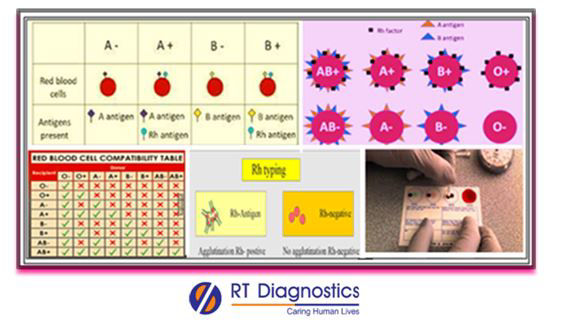Blood Group & RH Typing:
Why blood group and RH Typing Test?
CLINICAL INFORMATION
Blood typing (group and Rh) determines a person’s blood type. The significance of this test is of immense importance in case of blood transfusion or surgeries such as organ transplant and /or conditions such as erythroblastosis fetalis – hemolytic anemia in the fetus (caused by transplacental transmission of maternal antibodies to fetal red blood cells of the developing fetus and hence ABO Rh screening test is performed during pregnancy), because accidentally (pre-analytical errors, screening errors or post-analytical errors) when the patient receives such incompatible blood type (unintentionally) could trigger a dangerous immune response (agglutination) that could be fatal.
Blood Groups - Possible blood groups ABO include O, A, B or AB (Type A has A antigen, Type B has B antigen, Type AB has both A and B antigens and Type O has neither A nor B antigens) which is determined by inheritance (from parents to offspring’s transferred through DNA). Rh Typing - Rh antigen is present on the surface of RBCs. The presence of this antigen Rh factor or Rh protein) on the surface of RBC determines individual blood group as Rh-positive or Rh-negative. Two steps are involved in this test. The first step in the blood grouping procedure is called forward typing and the second step is called back typing. Forward typing is a test performed where blood sample specimen is tested against 2 solutions i.e one with antibodies against A antigen (Anti –A) and the other with antibodies against B antigen (Anti –B). The test screening result with clumping of cells known as agglutination suggests the presence of that specific blood group present in the person. Reverse typing is the confirmatory test performed to double-check the test results. In this test, the person’s plasma is mixed with type A blood first and separately with type B to check the reaction (agglutination - clumping of cells). The final test procedure includes Rhesus typing, to check for the rhesus blood type of a person. The blood sample specimen of the person is mixed with antibodies to RhD and the test result with agglutination is an indicator for Rh-positive and the test result without agglutination is Rh-negative. Thus this test includes both ABO and RhD blood typing tests.

General Instructions:
Sample Requirement: Specimen - Blood sample collected from the vein or finger prick for capillary blood. Test Preparation: None.
NOTE - Sample for specimen collections may vary based on the patient’s condition/cases according to the patient’s presenting complaints/signs or symptoms:
SPECIMEN REQUIREMENT (Special or Rare Cases) - As instructed and guided by Physician / Clinician / Pathologist / as per Laboratory’s requirements, according to procedures and protocols.
Sample Requirement: Blood is taken from the vein or finger prick for capillary blood
Test Preparation: None
This Multi-Specialty Clinical Referral Laboratory RT DIAGNOSTICS provides precise and accurate tests with an extensive range of testing services to the medical centers to help in the diagnosis and identification of pathology in the test specimens for infectious diseases and also to evaluate the function of organ systems of the patient. It prevents further complications and helps to stabilize and restore health to near normalcy at the earliest without delay.



